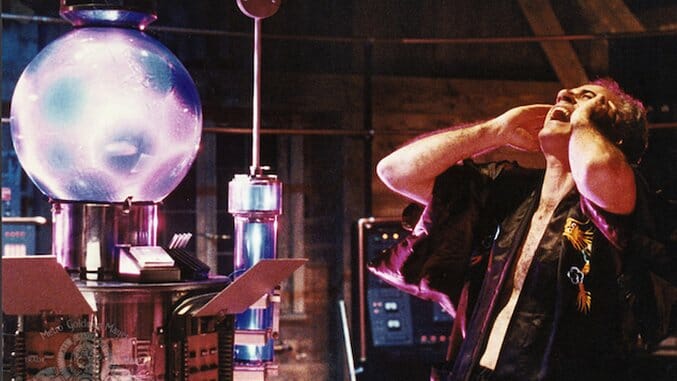Inside the H.P. Lovecraft Film Festival and CthulhuCon

Ninety years ago, a relatively unknown pulp fiction writer, H.P. Lovecraft, returned from a hellish two-year sojourn in New York City to his beloved, idyllic hometown of Providence, R.I. The move back sparked a major leap in his creativity, and the stories practically tumbled out. The core tales of his Arkham cycle, or as it is popularly known, the Cthulhu mythos, were written in this period, stories that sealed his reputation as one of the greatest American writers of the weird tale, second only in influence to Edgar Allan Poe. These stories reimagined the gothic tale for the modern age. Instead of demons, ghosts and goblins, the entities were alien beings, called Old Ones, from beyond the stars who had ruled the earth ages before humans emerged from the muck. The main characters were often obsessive outsiders, researchers into and connoisseurs of forbidden knowledge, men and women who pushed against the boundaries of commonly accepted realities into the vast truths that exist beyond the ken of mankind. Quite often, when ultimately confronted with these truths, they went insane.
 By any reckoning, H.P. Lovecraft was an unlikely candidate for a writer destined to achieve international recognition and acclaim. In the 80 years since his death, his stories and ideas have slowly percolated into widespread influence in the horror and science fiction fields, into film and mainstream popular culture. During his brief lifetime (he died of intestinal cancer in 1937 at the age of 46), his fiction was relatively unknown except to a small cadre of devoted friends and fans. During the 1960s and ’70s, his stories influenced or were adapted into episodes of The Twilight Zone and Night Gallery, into films by Roger Corman and for American International Pictures. During the 1980s director Stuart Gordon, with tongue firmly in cheek, brought Lovecraft’s ideas blood-drenched and screaming into the modern age with cult classics Re-Animator and From Beyond.
By any reckoning, H.P. Lovecraft was an unlikely candidate for a writer destined to achieve international recognition and acclaim. In the 80 years since his death, his stories and ideas have slowly percolated into widespread influence in the horror and science fiction fields, into film and mainstream popular culture. During his brief lifetime (he died of intestinal cancer in 1937 at the age of 46), his fiction was relatively unknown except to a small cadre of devoted friends and fans. During the 1960s and ’70s, his stories influenced or were adapted into episodes of The Twilight Zone and Night Gallery, into films by Roger Corman and for American International Pictures. During the 1980s director Stuart Gordon, with tongue firmly in cheek, brought Lovecraft’s ideas blood-drenched and screaming into the modern age with cult classics Re-Animator and From Beyond.
Flash forward to 1994. Andrew Migliore, a software engineer out of Portland, Ore., was researching how to publish on the then-fledgling web. Long before the days of “build your own blog” sites, his company had a product to help newspapers get their content online. To test the product, Migliore needed some content, and brainstormed, “I’ll make a movie site. I like Lovecraft so I’ll just do a bunch of Lovecraftian movies.” His research evolved into Beyond Books, a site devoted to cataloguing and reviewing movies based on the works of H.P. Lovecraft, such as Re-Animator, The Dunwich Horror and The Shuttered Room. Soon after the initial launch, he says, “People started contacting me.” Among them was director-writer John Strysik, who had worked on Tales from the Darkside as well as the short-lived series Monsters. During his college days at Columbia University, Strysik had written, produced and directed a short film called The Music of Erich Zann, based on the Lovecraft story. He offered to send a copy of the film to Migliore, who was impressed.
In contrast with the more straightforward Hollywood approach of Stuart Gordon, et al., Strysik had taken a more literary approach, matching the tonal qualities, mood and atmosphere of the story itself, in which the narrator has an experience—seeing Erich Zann’s musical performance open a portal to another universe—that doesn’t belong in his world, that is far outside the normal realms of everyday experience, and which leaves him haunted by this encounter for the rest of his days. “This was the first time I’d seen Lovecraft being taken seriously,” Migliore explains.
In the fall of ’95, Strysik asked Migliore if he’d like to screen the film in Portland. Migliore figured, “Great! I’ll start a film festival.” Strysik helped him track down Brian Yuzna, the producer of Re-Animator, which he’d wanted to show. Yuzna offered his unreleased film, Necronomicon, which was stuck in distribution limbo, instead. The producer also put him in contact with actor Jeffrey Combs ( Re-Animator, From Beyond), who introduced him to screenplay writer Miguel Tejada-Flores ( Revenge of the Nerds, the story for Beyond Re-Animator). “That’s how it all started,” Migliore recalls. “It was really that easy in some ways—some phone calls, and I guess being enthusiastic about it didn’t hurt.”
-

-

-

-

-

-

-

-

-

-

-

-

-

-

-

-

-

-

-

-

-

-

-

-

-

-

-

-

-

-

-

-

-

-

-

-

-

-

-

-








































